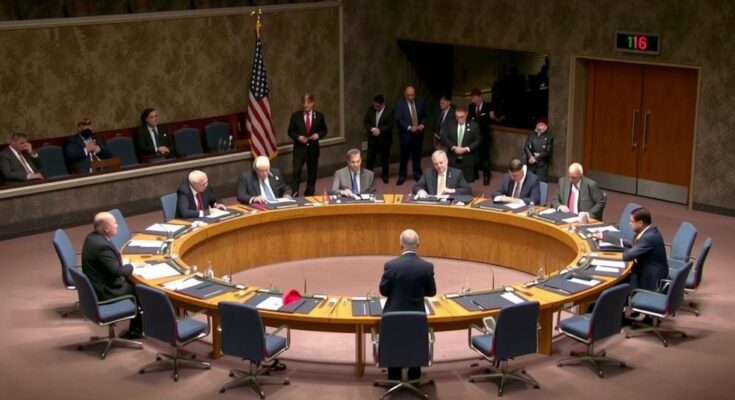On January 1, 2025, Pakistan began its two-year term as a non-permanent member of the UNSC, succeeding Japan. It secured its seat with 182 votes and will preside over the UNSC in July 2025. Pakistan aims to address global challenges, participate in the ISIS and Al Qaeda Sanctions Committee, and prioritize the Kashmir issue during its tenure.
On January 1, 2025, Pakistan officially commenced its two-year tenure as a non-permanent member of the United Nations Security Council (UNSC), marking its eighth term on this esteemed 15-member council. The country succeeded Japan as the representative for Asia. Ambassador Munir Akram accentuated Pakistan’s dedication to fulfilling an “active and constructive” role in addressing various global challenges throughout this period.
Pakistan’s ascension to the UNSC was secured through a decisive victory, garnering 182 votes within the 193-member General Assembly, thereby exceeding the two-thirds majority required for election. This current term will extend from January 1, 2025, and is set to conclude on December 31, 2026. Notably, Pakistan will hold the presidency of the UNSC in July 2025, which will entail leadership over the Council’s agenda during that month. Furthermore, during its term, Pakistan will also participate in the Islamic State (ISIS) and Al Qaeda Sanctions Committee, a key international body tasked with designating terrorist entities and implementing necessary sanctions.
Pakistan’s history within the UNSC includes previous terms spanning numerous years: 1952-53, 1968-69, 1976-77, 1983-84, 1993-94, 2003-04, and 2012-13. As it embarks on this eighth term, the country faces a complex international environment characterized by geopolitical turbulence, marked by escalating tensions among major global powers, armed conflicts across Europe, the Middle East, and Africa, as well as a noticeable arms race. Ambassador Akram emphasized that Pakistan is poised to advocate for peace, resolve disputes, and combat terrorism, reiterating the nation’s commitment to meaningful engagement in these vital issues.
During its tenure, Pakistan will also focus on regional challenges, particularly the ongoing Kashmir dispute, asserting its intention to elevate this matter within international discussions. Ambassador Akram has reiterated the necessity for the global community to take concrete actions regarding this longstanding issue. Overall, Pakistan’s new role on the UNSC involves myriad responsibilities aimed at enhancing international peace and security in an increasingly volatile world.
Pakistan’s election to the UNSC as a non-permanent member is significant as it reflects the country’s longstanding commitment to international diplomacy and cooperative security. The UNSC plays an integral role in maintaining peace and security globally, and non-permanent members participate in shaping the Council’s agenda and policies. Pakistan’s previous stints on the council have equipped it with valuable experience, allowing it to address critical issues such as terrorism, regional security challenges, and humanitarian crises. With its strategic geographic position and active involvement in various international alliances, Pakistan is set to navigate pressing global and regional matters during its upcoming term.
Pakistan has embarked on an important two-year term as a non-permanent member of the UNSC, armed with its experience from previous terms and a commitment to multilateral cooperation. Ambassador Munir Akram’s focus on addressing complex geopolitical issues and regional disputes, particularly the Kashmir conflict, underscores the nation’s intent to contribute meaningfully to global peace and security. As Pakistan assumes the presidency in July 2025, the world will be observing its actions and leadership on significant international matters.
Original Source: currentaffairs.adda247.com




